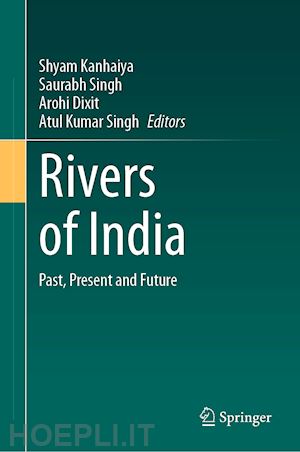
Questo prodotto usufruisce delle SPEDIZIONI GRATIS
selezionando l'opzione Corriere Veloce in fase di ordine.
Pagabile anche con Carta della cultura giovani e del merito, 18App Bonus Cultura e Carta del Docente
This volume presents geological, geographical, environmental, and agriculture related studies on rivers, focusing on basins of the three geomorphic divisions of India, i.e. peninsular India, Indo-Gangetic plain and extra-peninsular India. The book compiles data on both the small and large river systems of India, the large rivers include Jhelum, Ghaghara, Narmada, Son, Krishna and Godavari; and the small scale, rain-fed and groundwater-fed rivers such as Gomti have been studied. The chapters comprehensively provide assessments of geomorphological aspects, river sediment supply, clean water availability for human population, ground water recharge, flood management and irrigation. The information presented in this book will appeal to students, teachers, researchers and planners engaged in river development, management and conservation.
Chapter 1: Geomorphological & GIS based studies of catchment areas of River Narmada.- Chapter 2: Role of multipurpose river valley projects in the agricultural development of India since independence.- Chapter 3: Response of River Jhelum to active tectonics, NW Himalaya.- Chapter 4: Current Status of Pollution in Major Rivers and Tributaries of India and Protection-Restoration Strategies.- Chapter 5: Geochemistry and mineralogy of Peninsular Indian River sediments with special reference to Godavari and Krishna Rivers.- Chapter 6: Sand Mining: A silent threat to the River Ecosystem.- Chapter 7: Ecosystem Health Assessment and Biodiversity Conservation of Central Indian River Narmada.- Chapter 8: Evaluation of Water Quality through Water Quality Index (WQI), Gomti River , Jaunpur city.- Chapter 9: Geomorphology of the Son River Basin, India based on remotely sense data: a Review- Chapter 10: Role of rivers in the carbon cycleand the impact of anthropogenic activities.- Chapter 11: Decline of Dholavira urban settlement of Harappan Civilization in Kachchh was associated with global climate change rather than the decline of any major fluvial system,- Chapter 12: Ghaghara River: A case study of flood in Uttar Pradesh by GIS based technique.- Chapter 13: Flood Hydrology, Hydraulics and Hydrodynamics of the Tapi River: Western India.- Chapter 14: Geomorphological analysis of the Ukhma River Basin from the Northern foreland of Peninsular India.
Dr. Shyam Kanhaiya is currently Assistant Professor and Head of the Department of Earth and Planetary Sciences, Professor Rajendra Singh (Rajju Bhaiya) Institute of Physical Sciences for Study and Research, Veer Bahadur Singh Purvanchal University, Jaunpur, Uttar Pradesh, India. He did his Ph. D. from the Department of Geology, Banaras Hindu University, Varanasi, Uttar Pradesh, India. His area of interest is geochemistry of earth surface processes: river processes geochemistry, chemical weathering of rocks, sediment geochemistry, paleoclimatology and provenance studies besides fluvial sedimentology of the Ganga Plain. He has published a number of research papers in various national, international Journals. He received research grants from the various funding agencies i. e. University Grant Commission (UGC), Science and Engineering Research Board (SERB) and Department of Higher Education for working on the various aspects of geosciences. Currently, he is supervising three Ph. D.students working on the various aspects related to geomorphology and fluvial sedimentology. He is also engaged in various administrative works apart from the teaching and research.
Dr. Saurabh Singh is Assistant Professor in the Department of Geology, Institute of Earth and Environmental Sciences, Dr. Rammanohar Lohia Avadh University, Ayodhya, Uttar Pradesh, India. He obtained his doctorate degree from the Department of Geology, Banaras Hindu University, Varanasi in 2017. His research area is applications of Remote sensing & GIS, Quaternary geomorphology and optically stimulated luminescent (OSL). Dr. Singh has authored numerous papers in peer-reviewed journals of his research areas.
Dr. Arohi Dixit has obtained her Master of Science and Master of philosophy from School of Environmental Sciences, Jawaharlal Nehru University, New Delhi, India. She earned her doctorate from Jawaharlal Nehru University, New Delhi. The area of his doctoral researchis “Biogeochemistry for the Assessment of Wetlands of Gurugram, Haryana”. She is currently working as a Guest Faculty in School of open learning, University of Delhi, New Delhi India. She has published various research papers in the field of surface water quality, environmental geochemistry, and soil & water pollution. She is a Wetland Ambassador (2018), Society of Wetland Scientists (SWS), USA. She is also working actively in the conservation of urban wetlands in Delhi NCR region, New Delhi, India.
Dr Atul Kumar Singh is a Ph. D. in Geology with specialisation in Quaternary Geology, Geomorphology and Luminescence Dating. He did his graduation and post-graduation from University of Allahabad. He moved to Indian Institute of Science Education and Research (IISER) Kolkata for his doctorate degree. He did phenomenal work in understanding the evolution of fluvial landforms in Darjeeling-Sikkim Himalayas. Currently he is working as Assistant Professor in the Department of Geology, North-Eastern Hill University, Shillong, Meghalaya, India. He is interested in understanding Earth surface processes and influence of climate change and tectonics on landscape evolution. His research interests also include Remote Sensing and GIS of fluvial systems, application of 14C, 10Be and 26Al dating in geomorphology. He has several publications in peer-reviewed journals from his research field.










Il sito utilizza cookie ed altri strumenti di tracciamento che raccolgono informazioni dal dispositivo dell’utente. Oltre ai cookie tecnici ed analitici aggregati, strettamente necessari per il funzionamento di questo sito web, previo consenso dell’utente possono essere installati cookie di profilazione e marketing e cookie dei social media. Cliccando su “Accetto tutti i cookie” saranno attivate tutte le categorie di cookie. Per accettare solo deterninate categorie di cookie, cliccare invece su “Impostazioni cookie”. Chiudendo il banner o continuando a navigare saranno installati solo cookie tecnici. Per maggiori dettagli, consultare la Cookie Policy.